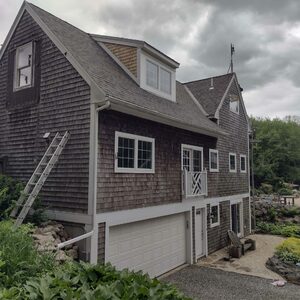Hi all. I’m in my rental house now. I just turned on the washing machine for the first time, and when it filled and went into its wash cycle, all the lights in the house started rhythmically flickering. What gives? For a while, I thought I was having a stroke or my retinas were detaching, but no, it quit when I turned off the washer. Dangerous, fixable, or merely tolerable problem? TIA
“Our whole American way of life is a great war of ideas, and librarians are the arms dealers selling weapons to both sides.”
-James Quinn



















Replies
I have two points of thought to present. Let's see what the opinions are of others, but if I recall correctly current code calls for a dedicated outlet to service the washer and again if I recall correctly, part of the reason for this requirement is to prevent the very thing (at least in part to a larger degree) which you are experiencing.
When any motor kicks on there is typically a big "surge" of power it sucks for a brief moment. If you have other devices on that circuit, such as lights, then you see the effects of that "surge" the motor sucks up by the lights flickering momentarily since they're not getting as much juice.
If you can rewire the washer outlet to be dedicated on its own breaker I think you'll have improved results. Is it a danger the way it is? Again, not sure, but I can't think of any reason why it would be, other than to be an annoying inconvenience.
Secondly, though I can't prove or support this but I once heard, too, that a poor quality panel can also play a role. I confess I've not heard this from any other source other than one person. From what I recall him saying some panels are of poor quality such that the breaker contacts aren't a quality contact and he said that such a condition can exacerbate "minute" things such as flickering lights, making them worse than they'd otherwise be. As for the poor quality panels, indeed I can vouch for that, they exist, I've ripped a number of them out. As to whether or not what I was told has truth in it, that I cannot say with certainty, again due to the fact I've never heard anyone else suggest such a thing. I do know poor quality panels can give you an "electrical hum" or "electrical buzzing" sound.
I just re-read your posting. One other thought that came to mind (others may know more about this than I) is maybe the motor is defective? Only once have I had a motor cause some electrical mayhem due to it going bad and it was minor mayhem a that, but I don't know anything else about how motors could cause a problem such as that you're experiencing. I'm just suggesting that it's possible. You said "rhythmically" so it makes me wonder if the motor could be the culprit since it is rhythmic in is operation in turning the agitator.
Did the lights just flicker for a second or two or during the entire cycle when the motor is turning?
_______________________
Tool Donations Sought
I'm matching tool donors to a church mission to Haiti - we're shipping a bus converted to a medical facility in (now it looks like) April and can fill it with clothes, tools and all sorts of stuff needed in that poorest of all countries. A few hand tools or power tools can provide a livelihood for an otherwise destitute family. Please email me if you have tools to donate.
Thanks to Jeff and David and Jim and Rich and Steven and Mark and Jason for their offers!
The list keeps growing
What is the age of the house? Go look at the fuse/circuit breaker pannel and see what size it is. For a CB pannel look at the number molded into the main breaker. It has been a long time since I have look at a fuse pannel so I don't remember how they are marked.
For am older home a very slight dimming for about 1-2 seconds when the washer starts up (including each cycle) is normal.
But if the lights continouse flicker and specially if they get brighter than you might have a serious problem.
See http://forums.prospero.com/n/mb/message.asp?webtag=tp-breaktime&msg=38189.1
Could the filaments in the bulb be the culprit? I have seen "on sale no name " bulbs wiggle when the lamp was vibrated a little by the dog scratchin near by.
Possible, but very very doubtful.
I have light mounted on a porch column that will do that. It uses a clear bulb and I have to be careful about what kind I get or I can see the filament dance when I walk on the porch.
But unless the washer on the floor just over the light I don't think that you would see anything.
But the question of which lights do this does help pinpoint the problem.
Start with the basics. Go through your panel and tighten every connection especially the neutrals. Check the receptacles to make sure they are connected tightly by the screw terminals and not back wired. Don't forget the terminations in your meter socket.
Good luck
Bad circuitry, no doubt. The question is where and why. If this house was built in the time period of roughly 1964-1970 then aluminum wiring is a possibility, and that can be quite dangerous. Otherwise it's probably garden variety inadequate wiring, somewhat dangerous, but more just a nuisance.
If you think it's dangerous, and your landlord won't react, call your local electrical inspector. If the whole house gets red-tagged there is a slight risk the place will be condemed and you'll have to move out, but more likely the landlord will be "inspired" to get it fixed.
I had a loose neutral in the panel that caused the same type problem. Can be destructive since when one line side is low voltage the other is high.
I had a customer/neighbor where I was doing some work. I noticed the same thing, as the washer agitated the den light (lamp) flashed to keep time with the change in direction. It turned out that two bedrooms, den, bath, washer were on one old 15 amp CB. I convinced her to bring in the electrician and run a dedicated 20A to washer and a new one to the bath also. To top it off a lot of the connections were backstab. I am surprised the washer worked at all.
A while later I was replacing a kitchen to patio door and found a rather large wire covered by the casing. Feed for dryer! tried to trace it back and found three different types of wire in circuit but could not find any junction boxes. It was a fairly easy sell for a new run from panel. Another modest referral from my electrician.
A couple of further points...
The washer is new. Could be a bad one.
All the lights throughout the house were flickering. That's why I thought it was me going to meet Jesus or something.
This was NOT happening last week, when the guys who installed the new windows had their compressor and other equipment plugged into the same receptacle.
I don't know the age of the house, or the status of the wiring. But I will check in with the landlord, and try to have the circuits, etc., checked. I'd feel comfortable doing a little sleuthing, if it were my old house which I owned, but this one is totally unfamiliar, and, of course, not mine.
Thanks for the ideas."Our whole American way of life is a great war of ideas, and librarians are the arms dealers selling weapons to both sides."-James Quinn
One point: If some lights get BRIGHTER when "flickering" vs dimming then the problem is a floating neutral, a possibly dangerous situation. Otherwise the only serious danger would be with aluminum wiring or some really inadequate, jackleg wiring.
It would be wise for you to inspect what wiring is visible and determine if it appears to be professionally installed or not. Neat wiring, with all connections in boxes and no use of "lamp cord" or other non-standard wire indicates a professional job (or at least a decent amateur).
Aluminum wiring can be identified by opening a few outlets and looking at the wire ends (whitish silver color vs copper or tarnished copper color), but since aluminum wiring is supposed to use the "stab lock" openings in the back of the outlets, it generally requires removing the outlet to see the wire, and that's probably more than you want to do. However, if you have some long exposed runs of "romex" (eg, in an unfinished basement) the printing on the wire should say whether it's aluminum ("AL") or not.
I suspect that there are one or more loose connections being vibrated by the washing machine. Is your main panel near, possibly along the same wall, as the washer? Maybe one level up or down?
I would call the owner and get him/her to get an electrician to check it out. Often finding the loose connections is a simple matter of putting a light, incandescent drop light works, and tapping the junction boxes in the area with a screwdriver handle. Or pounding around the walls with a fist. When the light flickers you know your close. Running the washer and getting a helper to jump up and down to create vibrations are also good options. Most of those helpers are a bit chubby and could use the exercise.
The poster that suggested that the main panel be checked and connections tightened is giving, IMHO, good advice. Just make sure they don't tighten the connections in the panel before checking the area around the washer, don't forget the floor above it. If you tighten the connections in the panel as a group and the problem goes away they won't be sure what did it and that it won't return.
Have the main panel checked in addition to troubleshooting this particular problem. They should check terminal voltages and through connection voltages under load. This will largely eliminate any chance that this is a problem with the neutral. Possibly the biggest danger. This check shouldn't take over ten minutes or so so your not asking for much. These checks are part of regular maintenance that should be done every few years. Ideally one a year. Many contractors will do it as a courtesy.
From what you posted I guestimate there is no great danger, no need to take up housekeeping in a tent in the back yard, but getting it checked out in a timely manner would be best. I would think that the houses owner would be interested in getting this taken care of. They would be protecting their investment.